七年级英语下册 Unit 11 How was your school trip Section A-1课件 (2012新版)人教新目标版
七年级英语下册Unit 11 How was your school trip超全重要短语和句子(英汉対译)
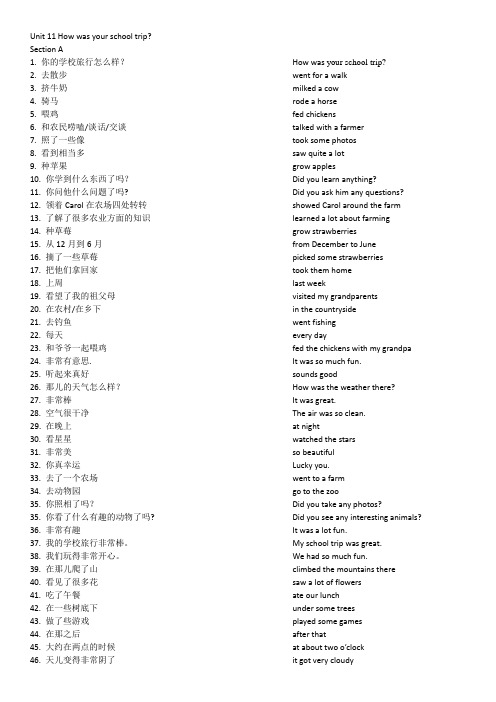
Unit 11 How was your school trip?Section A1. 你的学校旅行怎么样?How was your school trip?2. 去散步went for a walk3. 挤牛奶milked a cow4. 骑马rode a horse5. 喂鸡fed chickens6. 和农民唠嗑/谈话/交谈talked with a farmer7. 照了一些像took some photos8. 看到相当多saw quite a lot9. 种苹果grow apples10. 你学到什么东西了吗?Did you learn anything?11. 你问他什么问题了吗? Did you ask him any questions?12. 领着Carol在农场四处转转showed Carol around the farm13. 了解了很多农业方面的知识learned a lot about farming14. 种草莓grow strawberries15. 从12月到6月from December to June16. 摘了一些草莓picked some strawberries17. 把他们拿回家took them home18. 上周last week19. 看望了我的祖父母visited my grandparents20. 在农村/在乡下in the countryside21. 去钓鱼went fishing22. 每天every day23. 和爷爷一起喂鸡fed the chickens with my grandpa24. 非常有意思. It was so much fun.25. 听起来真好sounds good26. 那儿的天气怎么样?How was the weather there?27. 非常棒It was great.28. 空气很干净The air was so clean.29. 在晚上at night30. 看星星watched the stars31. 非常美so beautiful32. 你真幸运Lucky you.33. 去了一个农场went to a farm34. 去动物园go to the zoo35. 你照相了吗?Did you take any photos?35. 你看了什么有趣的动物了吗? Did you see any interesting animals?36. 非常有趣It was a lot fun.37. 我的学校旅行非常棒。
郑州市七年级英语下册Unit11Howwasyourschooltrip笔记重点大全

郑州市七年级英语下册Unit11Howwasyourschooltrip笔记重点大全单选题1、They ________ their homework yesterday.A.didn’tB.don’tC.didn’t doD.don’t do答案:C句意:昨天他们没有做作业。
考查一般过去时态。
根据“yesterday”可知是一般过去时态,句子谓语动词为实意动词do,否定句借助助动词do 的变形didn’t,助动词后加实意动词原形。
故选C。
2、—The little mouse in a red hat is really ________. Who painted it?—Tom did. He is good at painting.A.lovelyB.easyC.cheapD.ugly答案:A句意:——戴红帽子的小老鼠真可爱。
谁画的?——汤姆画的。
他擅长画画。
考查形容词辨析。
lovely可爱的;easy容易的;cheap便宜的;ugly丑陋的。
根据下句“He is good at painting.”可推知,应是小老鼠很可爱。
故选A。
3、Thanks for giving me ________help.A.so muchB.so manyC.such muchD.such many答案:A句意:谢谢你给我这么多帮助。
考查形容词短语。
“这么多”只能说“so much/so many ”,不能说“such much/many ”;so much修饰不可数名词,so many修饰可数名词复数。
Helpa(帮助)是不可数名词,故用so much;选A。
4、He has some ________ and I have some ________.A.egg; saladB.tomatoes; pearC.ice-cream; appleD.strawberries; milk答案:D句意:他有一些草莓,我有一些牛奶。
人教版七年级英语下册Unit11Howwasyourschooltrip单元复习
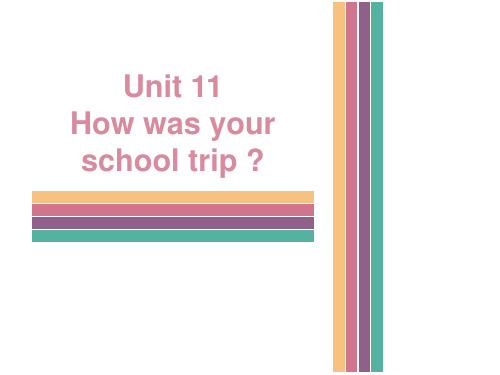
2.__ta_k_e_____ 4.__h_a_d_____ 6._r_o_d_e_____ 8.__b_u_t_____ 10.__a_______
基础复现天天练 Work seriously
●难点释疑 ①go on a school trip意为“参加学校郊 游”。如: All the students went on a school trip last week. 上周所有学生都参加学校郊游活动。 ②worry是动词,意为“担心”。常见一般 搭配为 worry about。如: You don’t need to worry about me.
目录 contents
4 主要语法
主要语法
Work seriously
四、主要语法 用一般过去时询问或描述过去事 件及关感受
★询问对过去事件的感受: 1.—How was your school trip? —It was great. ——你的学校旅行怎么样?——很好。 2.—Were the strawberries good ? —Yes, they were. ——草莓好吃吗?——是的,好吃。
Life on the farm was so much 8 .We went fishing in the early morning, went 9 a walk after
基础复现天天练 Work seriously
supper and watched the 10 at night when the weather was fine.They were very beautiful.
Have 10 nice day! Write to me if you can.
Yours, Lily
新目标英语七年级下册讲义—Unit 11 How was your school trip

新目标七年级下册Unit 11 How was your school trip? 讲义一、重点单词k 挤奶2. cow .奶牛3. horse 马4. feed 喂养;饲养5. farmer 农民;农场主6. quite 相当;安全7. anything (常用于否定句或疑问句)任何东西;任何事物8. everything 一切;所有事物9. grow 种植;生长;发育10. farm 农场;务农;种田11. pick 采;摘12. excellent极好的;优秀的13. countryside 乡村;农村14. yesterday 昨天15. flower花16. worry 担心;担忧17. luckily 幸运地;好运地18. sun 太阳19. museum博物馆20. fire 火灾21. painting .油画;绘画22. exciting adj.使人兴奋的;令人激动的23. lovely可爱的24. expensive 昂贵的25. cheap 廉价的;便宜的26. slow缓慢的;迟缓的27. fast 快地(的)28. robot .机器人29. guide 导游;向导30. gift 礼物;赠品31. dark 黑暗的;昏暗的32. hear(heard)听到;听见自测表:二、短语归纳1.school trip 学校旅行2.go for a walk 去散步k a cow 给奶牛挤奶4.ride a horse 骑马5.feed chickens 喂鸡6.talk with 和......交谈7.take photos /a photo拍照st week上周9.ask some questions问一些问题10.quite a lot 相当多11.show sb. around sp.带某人参观某地12.learn about 了解13.grow strawberries种植草莓14.from...to... 从…到…15.pick some strawberries摘草莓16.take sth home带…回家17.climb the mountains 爬山18.visit my grandparents看望我的祖父母19.go fishing 去钓鱼20.so much 如此多的21.go to the zoo去动物园22.go to a farm去农场23a lot of fun很多乐趣24.play games 做游戏e out 出来26.go to the countryside去乡下27.science museum科学博物馆28.visit a museum 参观博物馆29.play chess with sb... 和…下棋30.buy sth for sb为某人买31.be interested in…对…感兴趣32.all in all总的来说33.not...at all 一点也不,根本不三、句型集萃1. How + be…? + like? ……怎么样?2. How do/does+主语+feel about...? 对......感觉如何?3. too many + 可数名词复数太多的……4.teach sb. how to do sth. 教某人怎样做某事5.quite + a / an + 形容词+可数名词单数= a + very + 形容词+可数名词单数一个相当/ 很……6.buy sth. for sb.=buy sb. Sth.为某人买东西7.It’s +形容词+to do sth. 做某事是......的8.sound+形容词听起来......四、词汇、句型讲解及拓展1.How was your school trip?学校旅行怎么样?【解析】How+be+主语?=What be+主语+like?意为“….怎么样?”★★★本句的答语:It was great./It was OK./It was/wasn’t good….【拓展】how是疑问副词,意为“怎么样,怎么”,用来构成特殊疑问句,主要用法如下:1)询问如何做某事,或者做某事方式。
七年级英语下册 Unit 11 How was your school trip重点单词及句型背诵、默写 (新版)人教新目标版
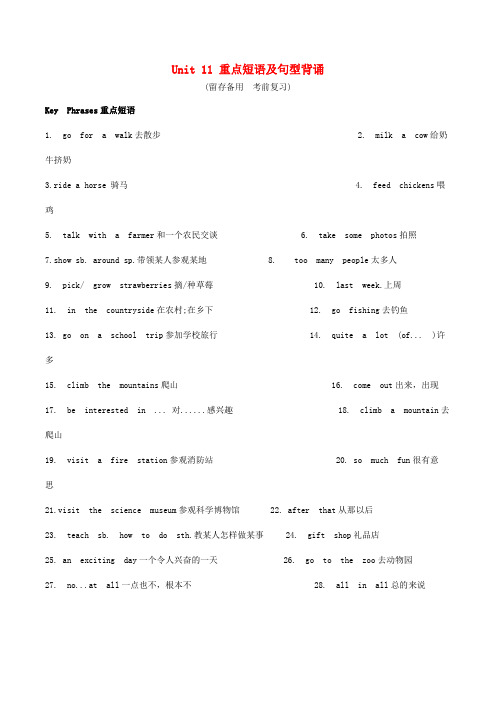
Unit 11 重点短语及句型背诵(留存备用考前复习)Key Phrases重点短语1. go for a walk去散步2. milk a cow给奶牛挤奶3.ride a horse 骑马4. feed chickens喂鸡5. talk with a farmer和一个农民交谈6. take some photos拍照7.show sb. around sp.带领某人参观某地 8. too many people太多人9. pick/ grow strawberries摘/种草莓 10. last week.上周11. in the countryside在农村;在乡下 12. go fishing去钓鱼13. go on a school trip参加学校旅行 14. quite a lot (of... )许多15. climb the mountains爬山 16. come out出来,出现17. be interested in ... 对......感兴趣 18. climb a mountain去爬山19. visit a fire station参观消防站 20. so much fun很有意思21.visit the science museum参观科学博物馆 22. after that从那以后23. teach sb. how to do sth.教某人怎样做某事 24. gift shop礼品店25. an exciting day一个令人兴奋的一天 26. go to the zoo去动物园27. no...at all一点也不,根本不 28. all in all总的来说29. learn a lot about ... 学了很多关....的知识Key Sentences 重点句型1. The farmer showed Carol around the farm. 这位农场主带领卡罗尔参观了农场。
人教版七年级下册 Unit 11 How was your school trip 知识点(适合于听写 学生对照背诵)-带答案

人教版七年级下册Unit 11 How was your school trip 知识点1.把...喂给...用...喂养...以...为食...2.一个能干的农夫正在他的大农场耕作。
3.在农场周围散步4.许多/ 许许多多的5.我有很多事情要告诉你。
6.相当漂亮的一个女孩(quite / very )7.你知道关于他的一些事吗?8.带领某人参观某地9.show up / show off / on show10.看见一些有趣的事情11.从某人哪里学到很多关于12.名词前有哪些词时,无介词13.一名优秀的运动员在...方面优秀14.幸运的是,我们及时上了汽车。
15.一般过去时的标志词16.蛮好玩17.你说的太多了18.so many 和so much的区别19.很开心做某事20.担忧某事(worry)2种e out 的含义3种22.天气变得非常的晴朗。
23.长得很好/ 长大/种植水稻24.绘画/ 油画25.去旅行(2种)26.到...去旅行/ 去度假27.沿途/ 顺便问一下/ 以这种方式28.教我们如何制作机器人教某人如何做某事29.教某人某事30.我不知道去哪里/做什么/怎么做31.北京房子的价格很高。
32.总的来说33.让人兴奋的一天34.今天的学校旅行/五分钟的路程35.复合不定代词36.对...感兴趣/37.听到某人做某事/听到某人正在做某事38.不客气(all)39.作文构思40.你的学校旅行怎么样?41.去散步42.给奶牛挤奶43.骑马44.喂鸡45.与农民交谈46.拍一些照片47.带领Alice参观农场48.学习了很多关于农务49.从十二月到六月种植草莓50.摘一些草莓51.带他们回家52.你上周旅行怎么样?54.我去农村拜访我爷爷奶奶了。
55.你做什么了?56.我晚上观看星星了。
57.你真幸运。
58.你去动物园了吗?不,我没有。
我去了农场。
59.你看到一些牛了吗?是的,看到了。
我看到了很多。
人教版英语七年级下册Unit_11_How__was_your_school_trip_?_Section__B
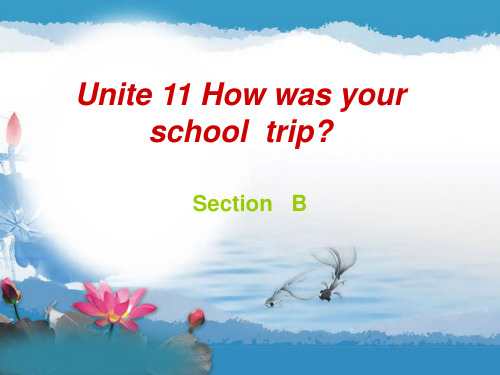
2c Complete the chart. How do Helen and
Jim describe these things?
Helen the trip the train Jim
1c Listen again. What did Jane and Tony
do on their last school trip? Check (√) Tony or Jane.
went to the countryside climbed went to saw some drew a an art paintings pictures mountain museum
watch flowers
watched flowers
pick strawberries picked strawberries
1a Match the activities with the pictures 1.go to the zoo __ 4. climb a mountain__ 2.visit a museum__ 5. visit a fire station__ 3.ride a horse__ 6.go fishing__
e
a
d
b
f
c
1a Match the activities with the pictures 1.go to the zoo _a_ 4. climb a mountain_e_ 2.visit a museum_c_ 5. visit a fire station_d_ 3.ride a horse_b_ 6.go fishing_f_
II. 译出下列短语 去散步 去购物 去钓鱼 挤奶牛 骑马 骑自行车 喂小鸡 和某人谈话 拍照
洛阳市七年级英语下册Unit11Howwasyourschooltrip必考知识点归纳

洛阳市七年级英语下册Unit11Howwasyourschooltrip必考知识点归纳单选题1、Robert was very upset that most of his friends ________ when he ________ at the party.A.left; had arrivedB.left; arrivedC.had left; arrived答案:C句意:当罗伯特到达晚会时,他的大多数朋友都走了,他很难过。
考查动词辨析和时态。
leave离开;arrive到达。
分析“Robert was very upset that most of his friends...when he...at the party.”可知,当罗伯特到达晚会时,他的大多数朋友都走了。
“到达”这一动作发生在过去,是一般过去时;“朋友已经走了”发生在过去的过去,用过去完成时。
故选C。
2、They ________ to the museum three days ago. They ________ there again tomorrow.A.will go; wentB.go; will goC.went; will goD.went; went答案:C句意:三天前他们去博物馆。
明天他们将再去那里。
考查时态。
go“去”,第一空根据时间状语“three days ago”,用一般过去时;第二空根据时间状语“tomorrow”,用一般将来时,故选C。
3、—I'm afraid we get lost.—Don't ________.I take a map with me.A.forgetB.thinkC.studyD.worry答案:D句意:----恐怕我们迷路了。
----别担心。
我带了一张地图。
考查动词辨析。
A. forget忘记;B. think认为,想;C. study学习,研究;D. worry担心,焦虑。
最新人教PEP版七年级下册英语Unit 11 How was your school trip?-文化背景资料

英语国家学校的school trips
若查词典,trip为“旅行;行程;旅游”之意。
在汉语言文化背景下的我们看来,trip 仅与户外游览相关,实则不然。
英美等国的中小学校每学期都会组织大量的校外游览和体验等活动,他们把所有走出校外的活动统称为school trips。
这些school trips或远或近,时而徒步,时而借助交通工具前往目的地,有些在室外,有些在室内。
纵观这些school trips,大致可分为以下三类:
1 )郊游观光
这种活动接近我国中小学校组织的“春游”或“秋游”,师生到郊外或景区、公园等地亲近自然、放松身心,调剂学校学习所带来的压力。
2)参观各类博物馆
英美等发达国家各个城市,无论大小,都有许多各类国立或地区性博物馆、科技馆、展览馆,且所有这些公立机构均实行免费参观制度,这就成为学校对学生进行各类文化和科学教育的好场所,因此学校会有计划地安排学生大量参加这样的“校外课堂”(school trips)生活。
当今,许多发达城市的私立博物馆、展览馆及音乐厅也愈来愈多地参加到学校社会教育的行列中来,免费或以低廉的学生集体票价位配合学校开展这样的school trips。
例如美国波士顿音乐厅每一学期及音乐演出季就推出若干学生专场音乐会,向学校提供更多组织school trips的机会,以此来推动古典音乐在青少年中的普及。
3)参加社会实践活动
组织学生参加社会实践活动也是中小学校school trips的重头戏。
这些
活动包括访问养老院、参与公益或慈善机构的活动、参观大学或研究机构、参加街道宣传等。
2020年人教版七年级英语下册Unit11 How was your school trip 要点详解
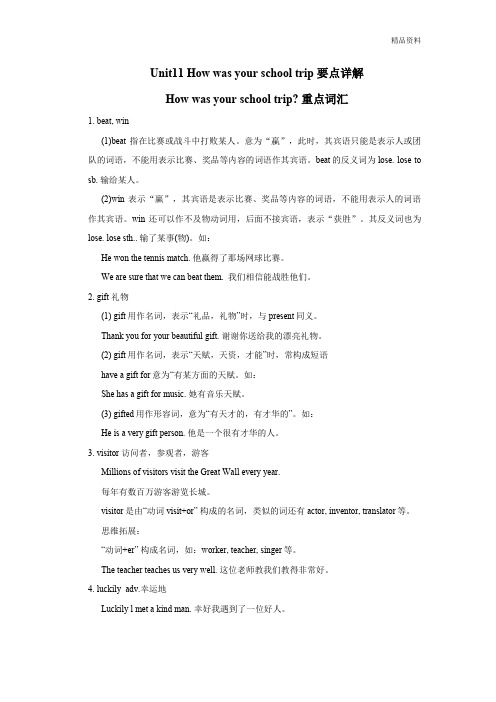
Unit11 How was your school trip 要点详解How was your school trip? 重点词汇1. beat, win(1)beat指在比赛或战斗中打败某人。
意为“蠃”,此时,其宾语只能是表示人或团队的词语,不能用表示比赛、奖品等内容的词语作其宾语。
beat的反义词为lose. lose to sb. 输给某人。
(2)win表示“赢”,其宾语是表示比赛、奖品等内容的词语,不能用表示人的词语作其宾语。
win还可以作不及物动词用,后面不接宾语,表示“获胜”。
其反义词也为lose. lose sth.. 输了某事(物)。
如:He won the tennis match. 他赢得了那场网球比赛。
We are sure that we can beat them. 我们相信能战胜他们。
2. gift 礼物(1) gift用作名词,表示“礼品,礼物”时,与present同义。
Thank you for your beautiful gift. 谢谢你送给我的漂亮礼物。
(2) gift用作名词,表示“天赋,天资,才能”时,常构成短语have a gift for意为“有某方面的天赋。
如:She has a gift for music. 她有音乐天赋。
(3) gifted用作形容词,意为“有天才的,有才华的”。
如:He is a very gift person. 他是一个很有才华的人。
3. visitor 访问者,参观者,游客Millions of visitors visit the Great Wall every year.每年有数百万游客游览长城。
visitor是由“动词visit+or”构成的名词,类似的词还有actor, inventor, translator等。
思维拓展:“动词+er”构成名词,如:worker, teacher, singer等。
The teacher teaches us very well. 这位老师教我们教得非常好。
河南省七年级英语下册Unit11Howwasyourschooltrip知识汇总大全

河南省七年级英语下册Unit11Howwasyourschooltrip知识汇总大全单选题1、My grandmother often ________ stories at night. What about yours?A.talksB.saysC.speaksD.tells答案:D句意:我奶奶经常在晚上讲故事,你奶奶呢? talk谈话,通常指两个人或多个人谈话; speak说,通常指说某种语言; tell讲,告诉,tell a story讲故事; say说,通常指说话的内容;故选D2、—Labor(劳动)education is important for students' development.—Yes. ________schools put it into practice, students will be more independent and helpful. A.WhileB.UnlessC.If答案:C句意:——劳动教育对学生的发展很重要。
——是的。
如果学校把它付诸实践,学生将会更独立和乐于助人。
考查if引导的条件状语从句。
While当……时;Unless除非;If如果。
分析句子可知,此处表示“如果学校把它付诸实践,学生将会更独立和乐于助人”,强调“如果”,是if引导的条件状语从句。
故选C。
3、— The song My Country and I is very________ in China.— Yes. Chinese like to sing this song to show their love of being Chinese. A.directB.clearC.popularD.correct答案:C句意:——歌曲《我和我的祖国》在中国很受欢迎。
——是的。
中国人喜欢唱这首歌来表达他们对中国人的热爱。
考查形容词辨析。
direct直接的;clear清楚的;popular受欢迎的;correct正确的;根据句意理解及后句Chinese like to sing this song to show their love of being Chinese.可知,这里表达的是“受欢迎的”,英语是popular,故选C。
河南省七年级英语下册Unit11Howwasyourschooltrip必考知识点归纳

河南省七年级英语下册Unit11Howwasyourschooltrip必考知识点归纳单选题1、We ________ a good time yesterday because it rained heavily.A.haveB.hadC.don’t haveD.didn’t have答案:D句意:昨天我们玩得不好,因为雨下得很大。
考查动词时态以及否定句。
根据“yesterday”可知,句子用一般过去时,排除A和C选项。
根据“because it rained heavily”可知,下大雨没有玩好,故选D。
2、—________ you stay at home last Sunday afternoon?—No, I ________ a kite with my friends in the park.A.Do; flyB.Did; flyC.Did; flewD.Were; flew答案:C句意:——上周日下午你待在家里吗?——不,我和朋友在公园里放风筝。
考查一般疑问句和动词时态。
根据“last Sunday afternoon”可知,句子时态应用一般过去时,再由空后的实义动词“stay”可知,第一空应用助动词did;根据问句可知答句应用一般过去时,第二空用fly的过去式flew。
故选C。
3、—Why don’t you buy the sweater?—It’s too ____, and I don’t have enough money to buy it.A.niceB.expensiveC.popularD.cheap答案:B句意:——你为什么不买那件毛衣?——太贵了,而且我也没有足够的钱来买它。
考查形容词辨析。
nice漂亮的;expensive昂贵的;popular受欢迎的;cheap便宜的。
根据I don't have enough money to buy it可知它很贵。
人教版pep英语七年级下册-Unit-11-单元分析

比分析能力。
品店的东西很贵。
分课时教学目标
课时 period 1
period 2
Period 3 Period 4
Period 5
分课时教学目标
学生能够: 1.了解卡罗尔在旅行中做了什么的详细信息,并复述卡罗尔的 旅行经历; 2.正确使用目标语言进行关于旅行的对话。
1.获得埃里克、简和托尼旅行的详细信息; 2.用目标语言复述和谈论这些旅行; 3.从更多方面分享我们自己的旅行,并思考我们可以从旅行中 得到什么。
作业设计 根据农场旅行vlog编写对话(学习理解+应 用实践) 描述自己的一段令人难忘的旅行经历(应 用实践+迁移创新)
利用静态雕像进行故事接龙(应用实践+迁 移创新)
按要求编写和Jim的对话(应用实践+迁移 创新)
写一篇旅行日记(应用实践)
教学内容 语篇类型
Period 4
2b两篇日记 (应用文)
What
Why
How
Helen和Jim的日记,记录了 2b两篇日记是两个人 因为是日记体裁,所以这两
对待同一场学校旅行两人不 对同一场学校旅行截 个语篇均使用第一人称和一
同的感受和评价。
然不同的记录与感受。 般过去时按照旅行发展的顺
Helen认为参观科学博物馆 启发学生对于看待事 序去展开描述,Helen与Jim
行很糟糕,觉得火车很慢车 写作。
lovely, exciting,
厢里面很热,博物馆大且无
terrible, hot, boring等
趣,因为他对机器人不感兴
形成的对比,这不仅考查了
趣。馆内很暗所以他没拍照。
学生对篇章的理解,培养了
而且人很多,他看不清也听
人教版初中英语7年级下册unit11知识清单+习题 (附解答)

七下Unit 11 How was your school trip?一、必会单词:milk v挤奶cow n 奶牛feed v喂养;饲养farmer n.农民;农场主quite adv相当;完全anything pron任何东西;任何事物grow v种植;生长;发育excellent adj极好的;优秀的pick v采;摘countryside n乡村;农村worry v &n担心;担忧luckily adv幸运地;好运地museum n博物馆painting n 油画,绘画exciting adj.使人兴奋的;令人激动的lovely adj可爱的cheap adj.廉价的;便宜的expensive adj.昂贵的slow adj缓慢的;迟缓的fast adv&adj.快地(的)robot n 机器人guide n 导游,向导gift n 礼物,赠品everything pron.所有事物;一切interested adj.感兴趣的dark adj.黑暗的;昏暗的hear v听到;听见二、常考短语:go for a walk去散步milk a cow给奶牛挤奶ride a horse骑马feed chickens 喂鸡talk with与…谈话take photos拍照quite a lot(of)许多show. ..around 带领…参观learn about了解from...to…从…到…grow strawberries种植草莓pick strawberries摘草莓in the countryside在乡下;在农村go fishing去钓鱼at night在夜晚come out出来fire station 消防站go on a school trip参加学校郊游along the way沿途after that之后all in all总的说来take a/ the train乘火车be interested in对……感兴趣not…at all根本不……How be..?…怎么样?How do/does+主语+ feel about….? …对…感觉如何?too many+可数名词复数太多….teach sb. how to do sth.教某人怎样做某事quite a/an+形容词+可数名词单数=a very+形容词+可数名词单数相当/非常…buy sth. for sb.=buy sb.sth.为某人买某物It’s+形容词+ to do sth.做某事是……的。
人教七年级英语下《Unit11HowwasyourschooltripPeriod4》
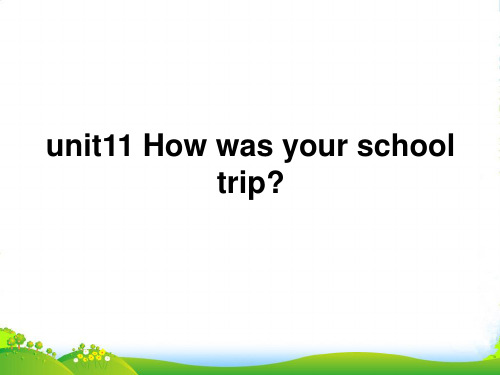
5. My father often
(swim)in this river when he was
young.
答案: 1. was 2. Were 3. visited 4. rode 5. swam
Ⅱ. 句型转换
1. She was a dancer 10 years ago. (改为否定句)
She
的消息时, 每个人激动不已。excited人感到兴奋, 修饰人;
exciting令人兴奋的, 指物体令人兴奋, 修饰物, 故选B。
【习作在线】 四练笔巩固--1师友练笔
请根据下表提示, 以“A Great School Trip”为题写一篇
英语短文, 介绍七年级一班去泰山(Mount Tai)校游的情况。
3. 昨天他参加了学校旅游。
He
a school trip yesterday.
4. 母亲教我如何做早饭。
My mother
me
cook breakfast.
5. 他一点也不喜欢这次旅行。
He
like the trip
.
答案: 3. went on 4. taught; how to 5. didn’t; at all
19. along the way 沿线
20. after that 之后 21. buy sth. for sb. 为某人买某物
22. all in all 总的来说 23. take a / the train 乘火车
一、知识回顾 ---2. 教师点评
【语法总结】一般过去时 (一)一般过去时的定义 一般过去时表示过去某个时间发生的动作或存在
→
(adv. )幸运地; 好运地
7. paint(v. )
人教版七年级英语下册 Unit11How was your school trip_重点知识点
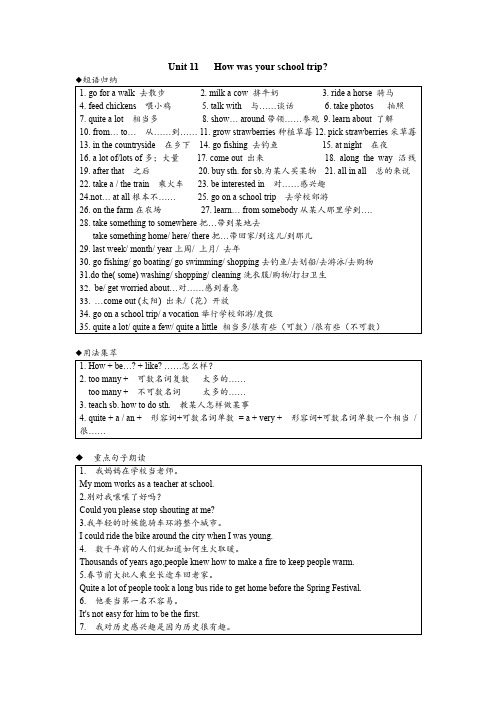
18.乘火车我们很快就到了那儿。
We got there so fast by train.
19.沿途我们看见了些农场和村庄。
We saw some farms and villages along the way.
20.我不知道它们还有本事和我们下棋。
◆用法集萃
1. How + be…? + like? ……怎么样?
2. too many +可数名词复数太多的……
too many +不可数名词太多的……
3. teach sb. how to do sth.教某人怎样做某事
4. quite + a / an +形容词+可数名词单数= a + very +形容词+可数名词单数一个相当/很……
4.数千年前的人们就知道如何生火取暖。
Thousands of years ago,people knew how to make a fire to keep people warm.
5.春节前大批人乘坐长途车回老家。
Quite a lot of people took a long bus ride to get home before the Spring Festival.
22. take a / the train乘火车23. be interested in对……感兴趣
24.not… at all根本不……25. go on a school trip去学校郊游
26.on the farm在农场27. learn… from somebody从某人那里学到….
28. take something to somewhere把…带到某地去
郑州市七年级英语下册Unit11Howwasyourschooltrip基础知识点归纳总结

郑州市七年级英语下册Unit11Howwasyourschooltrip基础知识点归纳总结单选题1、—There was a guide wanted for the butterfly house last week. Who got the job at last?—Oh, Tony _______.A.gotB.didC.getsD.does答案:B句意:——上周蝴蝶屋在招聘一名导游。
最后谁得到了这份工作?——哦,托尼得到了。
考查动词时态。
根据“last week”可知句子应用一般过去时,排除CD选项。
答语是一个简略回答,应用助动词did 代指“got the job”,故选B。
2、—I’m afraid we get lost.—Don’t ________. I take a map with me.A.forgetB.thinkC.worryD.talk答案:C句意:——恐怕我们迷路了。
——不要担心。
我带了一张地图。
考查动词辨析。
forget忘记;think考虑;worry担心;talk谈论。
根据“I take a map with me.”可知,此处是说带了地图,所以不用担心。
故选C。
3、He has some ________ and I have some ________.A.egg; saladB.tomatoes; pearC.ice-cream; appleD.strawberries; milk答案:D句意:他有一些草莓,我有一些牛奶。
考查名词辨析。
egg鸡蛋,可数名词;salad沙拉,不可数名词;tomatoes西红柿,可数名词复数形式;pear梨,可数名词;ice-cream冰淇淋,不可数名词;apple苹果,可数名词;strawberries草莓,可数名词复数形式;milk 牛奶,不可数名词。
两个空前都有some修饰,所以空处用可数名词复数形式或不可数名词。
故选D。
- 1、下载文档前请自行甄别文档内容的完整性,平台不提供额外的编辑、内容补充、找答案等附加服务。
- 2、"仅部分预览"的文档,不可在线预览部分如存在完整性等问题,可反馈申请退款(可完整预览的文档不适用该条件!)。
- 3、如文档侵犯您的权益,请联系客服反馈,我们会尽快为您处理(人工客服工作时间:9:00-18:30)。
Report
In my group, Zheng Hao went to
Guangzhou. He went shopping. Zhang Tuo … Liu Ying … And I … We …
went to the zoo
took photos
saw some interesting animals
2c
PAIRWORK
A: What did Carol do? B: She picked some strawberries.
2d
Role-play the conversation.
1. I saw quite a lot. 我看见许多(牛)。 quite adv. 相当;完全;十分;很 例如: She sings quite well. 她唱得非常好。
Unit 11 How was your school trip?
Section A Period 1(1a-2d)
Can you name the activities?
Watch TV Play soccer
Listen to music
dance exercise
Use the computer Clean the room go swimming
go -
went are - were
didn’t
don’t-
have - eat -
had
ate
bought
2 Listen and check (√) the questions you a hear.
• ___ What did the farmer say?
√ What did you see? • ___
What did they do yesterday?
milked a cow
They milked a cow yesterday.
What did he do yesterday?
rode a horse
He rode a horse yesterday.
What did he do yesterday?
fed chickens
He fed chickens yesterday.
What did she do yesterday?
talked with a farmer
She talked with a farmer yesterday.
What did he do yesterday?
took some photos
2b Listen again. Circle T for true or F for false.
1. The farmer showed Carol around the farm. T F 2. Carol learned a lot about farming. T F 3. The farmers grow strawberries from December to June. T F 4. The farmers don’t grow apples. T F 5. Carol picked some strawberries and took them home. T F
listened to music
danced exercised
used the computer cleaned the room went swimming
What did she do yesterday?
went for a walk
She went for a walk yesterday.
Carol did on her school trip in 1a.
1c
Pair Work
A: Did Carol take any photos? B: Yes, she did.
Group work: Make a survey! What did you do on your last school trip? Did you …? Name Zheng Hao Zhang Tuo Liu Ying I Activities went to Guangzhou, went shopping went to West Lake, went boating went to her aunt’s house, had pizza went to the beach, went swimming
3. And I fed the chickens with my grandpa. 我和我的爷爷喂鸡。 fed the chickens 喂鸡 例如: [əʊt]n.燕麦 He fed oats to his horse. 他给他的马喂养燕麦。
4. It was so much fun. 那真是蛮好玩的。 fun 表示“有趣的事情”,为不可数名词。 例如: Look, Peter. The children are having so much fun. 彼得,你瞧,孩子们玩得多么开心。 He plays the violin for the fun of it. 他拉小提琴只是为了好玩。 Swimming in the sea is great fun. 在海里游泳很好玩。
5. Lucky you! 你真幸运! 这是一句非正式口语,相当于You’re so lucky. lucky 之后的人称还可改为me, him 等。 例如: A: There was no power at school last night. It was so dark. 昨天晚上学校停电了,漆黑一片。 B: Lucky me. I was not here. 我多幸运呀,不在那里。
• ___ Did you learn anything?
• ___ √ Did you ask him any questions?
• ___ Did you grow any apples?
• ___ √ Do they grow apples?
• ___ Did you eat them?
• ___ √ Were they good?
2. Did Carol take any photos? 卡罗尔拍照片了吗? take与photo, picture 等词搭配时,表示 “拍摄;摄影”。表示“拍摄某物或 人”,则要在短语后面接介词“of” 引入 所拍摄的对象。例如: That girl likes to take photos of herself with her cell phone. 那个女孩喜欢用手机自拍。
• --What did you do last weekend?
• --I went to the park.
• --I went to the movies with my friends
What did you do last weekend?
watched TV played soccer
looked after my little brother cooked dinner read a book
Step2 Revision( The rules of the past form)
1.规则动词的过去式变化如下
work - worked want -
live- lived like -
How was your school trip? Did you go to the zoo? Did you see any …? Did… ride a horse? Were the … good?
A: How was your school trip?
B: It was great!
A: Did you go to the zoo last weekend?
B: Yes, I did.
A: Did you see any crows ?
B: Yes, I did. A: Were the crows good? B: Yes, they were.
Make a survey about what their friends or their parents did in their school trip.
wanted liked
study - studiedworry— worried
play- played stop- stopped stay - plan - stayed planned
2.不规则动词的过去式变化
do -
did am, is- was
isn’t - wasn’t
take - took buy -
climbed the mountains
saw a lot of flowers
ate our lunch
played some games
Milked a cow
rode a horse
took some photos fed chickens
did some cleaning
went shopping
sk and answer : Did you have a happy weekend?
, I did. , I didn't.
What did you do last weekend?
Asபைடு நூலகம் and answer in pairs.
• --How was your last weekend? • --It was great/OK/boring.
He took some photos yesterday.
1a Match the phrases with the pictures.
1. went for a walk ____ e 2. milked a cow ____ b 3. rode a horse ____ a 4. fed chickens ____ c
